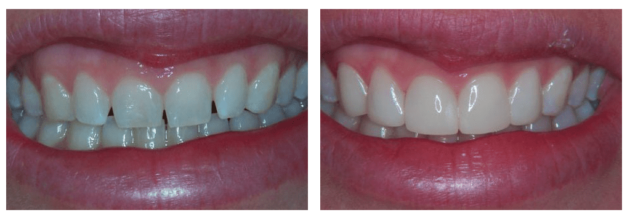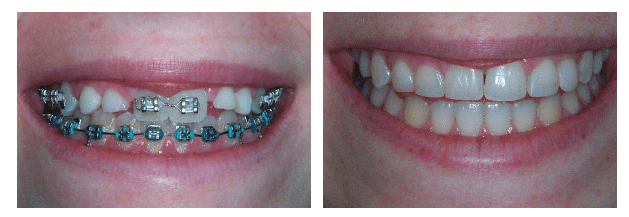Dental bonding is an effective cosmetic dental treatment for many dental concerns. From tooth damage to minor imperfections, tooth bonding can offer a quick, economical, and customized result. We recommend tooth bonding in our Media, PA office to treat chipped or cracked teeth, discolored teeth, and tooth gaps.
To see if dental bonding is for you, visit Dr. Gregory Hillyard and Dr. Alexandra Monroe’s Media, PA, dental office. They collaborate with patients of all ages to determine what treatment options work for their specific needs.

What is Tooth Bonding?
The tooth bonding process is similar to a dental filling. Our dentists utilize a composite resin material to create the look you desire or to replace lost or removed tooth structures. We can provide skilled, experienced cosmetic dental care and use tooth bonding to enhance the appearance of your smile.
Your treatment plan will be designed to support the long-term health of your smile, addressing any underlying problems that may have led to tooth damage or decay. The resin tooth bonding material is color-matched to meet your cosmetic goals and will create a smooth texture and natural-looking reflective surface once complete.
Tooth Bonding Treatment in Media, PA
We can provide Dental bonding treatment in a single visit to our Media, PA, dental office. Our dentist will prepare the tooth or teeth to be bonded by removing a small amount of surface enamel. An etching solution will create a slightly varied or rougher surface. This preparation ensures the material can adhere to the tooth and remain in place.
Then, our dentist will carefully sculpt the composite resin material. They will use a shade guide to match the shade of the bonded tooth to other natural teeth. Our dentists will adjust the bonded material for a stable fit and comfortable bite. Once complete, our dentist uses a UV light to cure the material. Finally, our dentist polishes the bonded tooth for a natural look.
How to Care for Bonded Teeth
Avoid staining foods and beverages after you receive bonding treatment. Tea, coffee, wine, tomatoes, berries, and other pigmented foods and drinks can change the bonding color. Also, avoid hard and crunchy foods right after your treatment. Biting directly on hard and crunchy foods can damage the bonding material.
You can brush and floss your bonded teeth like your natural teeth. Floss before brushing and use non-abrasive toothpaste to brush bonded teeth. Abrasive materials can damage the bonding.
Remember to schedule regular dental cleanings to maintain your bonded and natural teeth. We will take extra care to maintain your dental bonding.
The Uses of Dental Bonding
One of the best things about dental bonding is that it can treat various cosmetic issues. Bonding is more cost-effective than porcelain veneers, as it can handle all the same issues. Whether you have discolored teeth, teeth that are too far apart, misshapen teeth, or damaged teeth, dental bonding can probably help.
Since the material is malleable, it’s easy to shape to take on any form, whether evening out a chipped tooth or closing a tooth gap. We can color-match bonding to the exact color of your surrounding teeth. Our office can make teeth whiter with bonding. Once we bond teeth, we polish them, making them an almost seamless addition to your smile.
The main downside of dental bonding is that it isn’t considered a permanent restoration. On average, tooth bonding lasts 5-10 years. However, bonding can last longer if taken care of exceptionally well. If you’re unsure about a more permanent form of restoration or your child chips a tooth, this is the best option for cases like those.

Bonding to restore natural contours to teeth
Tooth Bonding FAQs
Discover more about dental bonding with answers to these common patient questions:
Is dental bonding painful?
No, dental bonding is not painful. There may be some sensitivity after the procedure, but it should disappear within a day or two. To minimize discomfort, you can take pain medication and avoid hard and crunchy foods.
Can you whiten your teeth after dental bonding?
Yes. You can whiten your teeth after tooth bonding. However, it is important to note that the bonding material will not change color. Therefore, you may still see a color difference if your teeth are significantly darker than the bonding material.
Does teeth bonding look natural?
Yes, dental bonding can give you a natural-looking smile. Our dentist will use a tooth-colored resin to match the color of your teeth and then shape and polish it to look like a natural tooth. Moreover, dental bonding can repair small chips or cracks, change teeth’ shape, and improve teeth’ color.
Does tooth bonding work on front teeth?
Yes, tooth bonding can work on front teeth. The procedure involves using a resin material to bond the tooth. Our dentist uses this material to improve the appearance of the tooth.
Can teeth decay under tooth bonding?
Yes, teeth can decay under tooth bonding. The bonding material is not as strong as the tooth enamel. Over time, the bonding material can break down and allow bacteria to get into the tooth, which can cause decay.
Can tooth bonding fall off?
Yes, tooth bonding can fall off. It’s possible for bonding to fall off if you experience tooth decay or a dental injury.
However, it is usually not a problem. Your dentist can rebond your bonding material to your teeth if it does fall off. Maintaining good oral hygiene and caring for your teeth and gums ensures the bonding does not come loose.
Can you whiten bonded teeth?
No, you can’t whiten bonded teeth with teeth whitening products. Dental bonding material doesn’t respond to whitening treatments the way natural tooth enamel does. If the bonding becomes stained or discolored over time, your dentist can replace it with a new shade to match your natural teeth. You can whiten your teeth before you get bonding so it matches your whiter smile.
How much is tooth bonding treatment?
The cost of tooth bonding treatment can vary based on the number of treated teeth. However, bonding is generally more affordable than other cosmetic treatments like veneers. Our dentist can give you an exact cost based on your specific needs. Dental insurance may also cover part of the cost of bonding for restorative reasons, like to repair a broken or decayed tooth.

Bonding to restore teeth to their natural size after undergoing orthodontic treatment
Contact Our Media, PA Dentist Office Today
Tooth bonding can last for five years or more with good oral hygiene and dental care. During routine visits, we will monitor the condition of bonded teeth to spot any signs of weakness or damage early on. You can care for bonded teeth like natural teeth with daily brushing and flossing. Call our dental office for an appointment to discuss your tooth bonding needs today at 610.566.0291.

